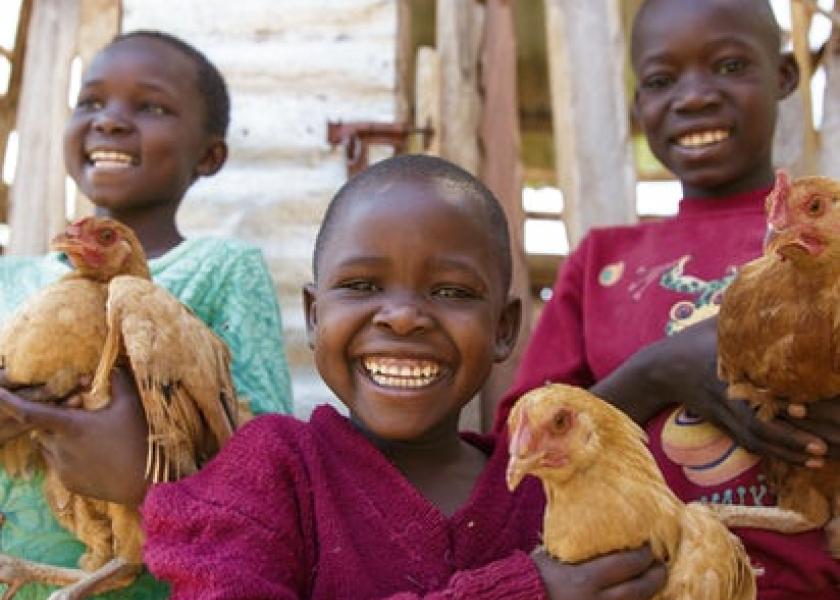Activists Play Grinch, Seek End To ‘Animal Gifting’

Warning: This is not a feel-good Christmas story. In fact, you’ll likely experience some anger at the pleas of the activists I’m about describe.
Just days before Christmas, all snuggled at my desk, I opened my email and there to my surprise, was this urgent plea for “world aid charities to end animal gifting.” Wut?
The message was from the Animal Save Movement and In Defense of Animals Interfaith Vegan Coalition. You won’t need to visit their websites to guess their ultimate goal. The Animal Save Movement, for instance, claims to be a group of activists that “bear witness to animals at the gates of slaughterhouses in order to expose and dismantle animal exploitation industries.”
Pffffttt! Wait, there’s more.
This urgent plea to end animal gifting was endorsed by Dr. Jane Goodall, the 90-year-old English primatologist and anthropologist famous for her 60-year study of social and family interactions of wild chimpanzees in Tanzania in 1960. Goodall is a vegan and advocates the diet for others.
Many activists want for us all to adopt a vegetarian or vegan diet, but this plea was different because it seeks that change through actions that will cause others to go hungry. That’s my opinion, of course, but how else to describe such narrow thinking? Goodall endorses the idea that “animal gifting programs hurt gift recipients by burdening them with more mouths to feed.”
No mention is made of the fact gifted animals turn grass and other non-human-edible plants into meat and milk.
The solicitation went on to claim that animal gifts “also worsen the climate crisis, decrease food stability, undermine sustainable development, contribute to animal suffering, and cause health impacts by promoting unhealthy western diets.”
The true cost, according to these activists, of “sending a goat, cow, chicken, or other farmed animal is environmental degradation, soil acidification, water contamination, air pollution, global deforestation, forest fires, extreme weather, flooding, zoonotic disease outbreaks, health problems such as diabetes, more community slaughterhouses, and even childhood trauma from watching beloved animals get brutally slaughtered.”
The Stop Animal Gifting campaign made direct pleas to development charities such as Heifer International and Cargill’s “Hatching Hope” project, which provides direct support to small-scale poultry farmers with a global goal of improving the nutrition and incomes of hundreds of millions of people.
The “Hatching Hope” project announced last year that in Kenya it will reach 10 million people in its first phase (2019-2022), through a combination of direct support to farmers and consumer-awareness campaigns, contributing to a global goal of improving the nutrition and incomes of 100 million people by 2030.
“By partnering with farmer producer organizations and other actors in a market system approach, Hatching Hope will improve the livelihoods of 46,000 households, positioning them as key players in the poultry value chain,” said Heifer Kenya Country Director George Odhiambo. “These interventions will lead to the creation of profitable and sustainable farmer-owned poultry businesses through access to products, service and markets.”
“Hatching Hope is an example of Cargill and Heifer’s shared belief in the value of safe, sustainable and affordable animal protein in the diet – as well as a commitment to improving the livelihoods of smallholder farmers,” said Rene Osorio, Managing Director, Cargill Animal Nutrition Middle East and Africa. “To have real long-term success, we see these participants as entrepreneurs – smart, resourceful animal producers. In teaching and sharing what we know we can support smallholder farmers to achieve the economic means to feed their children, send them to school and build resilient communities.”
Yet, in full Grinch-mode, the folks at Animal Save Movement and In Defense of Animals Interfaith Vegan Coalition, urge you not to support animal gifting, but rather support the implementation of plant-based food system projects.
While such an anti-food animal campaign does not directly target America’s beef industry, it should be viewed as another red-flag warning about the ultimate mission of such activists and their tactics. Key to these group’s ultimate success is convincing people that all animal agriculture is bad for both people and the planet. Trying telling that to impoverished people facing Christmas with an empty table.







